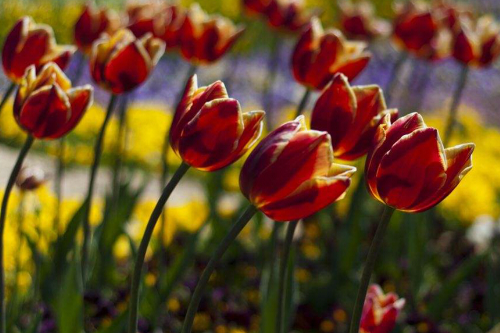Into the Light
向光而生
By Rachel Kelly
文/雷切尔·凯利
Eight years ago, the idea that I might ever emerge from the darkness of deep clinical depression and be well again seemed unthinkable. Yet now, many winters have passed and I have returned to the light. Mostly I am calm and well, and some days I even feel as if I’m walking on sunshine.
八年前,我几乎难以想象,自己能够脱离重度抑郁症的深渊,重获健康。然而,许多个寒冬之后,如今的我已经重回光明。多数时间里,我感到平静舒适,有时甚至觉得自己仿佛正踏着阳光前行。
My depression was born of[1] anxiety and feeling overwhelmed. At that low point almost two decades ago, it was so severe and the physical agony of the illness so painful, all I wanted to do was to die. I would lie in bed, clinging to[2]my mother’s arm so tightly that it was red from my clutch[3]. She was often all that lay between me and the real possibility of suicide: my husband was out at work and she had come to live with us.
焦虑不安和不堪重负导致我患上了抑郁症。大约20年前,情况跌至谷底,严重的抑郁伴随着巨大的生理痛苦,令我一心只想结束生命。我会躺在床上,紧紧抓着母亲的手臂,她的手臂因此而泛红。很多时候,母亲是我没有真的结束自己生命的唯一原因:丈夫当时在外工作,母亲来和我们同住。
[1] be born of 来源于,由……导致。
[2] cling to 紧紧抓住。
[3] clutch 抓住;握紧。
Now that I am feeling better, I am learning how to do less, to be more grateful and to enjoy the moment.
现在,我感觉好多了,逐渐懂得如何卸下重担、更加感恩并享受当下。
So blessed do I feel to have made this recovery that over the past year, I have been emboldened[4] to keep a diary of my progress.
能够痊愈,我感到无比幸运,因此在过去的一年中,我鼓起勇气以日记的形式记录下了自己所取得的进步。
[4] embolden 加强勇气或信心。
Here are eight of my small steps – two for each season – which have helped me become happier.
以下是我的八个小秘诀,每个季节两个,是它们帮助我成为了更快乐的人。
SPRING
春
Stuffocation[5]
杂物窒息
[5] stuffocation 由杂物(stuff)和窒息(suffocation)组合而成,指被堆积的杂物淹没而感到不堪重负。
I find the sunshine a welcome change, but with it comes a familiar itch[6]: the need to spring clean. April finds me noticing the dusty piles that seem to have accumulated in every corner. I know clearing cupboards clears my mind; feeling overwhelmed can quickly lead to feeling anxious.
阳光令我欢喜,但也带来了熟悉的躁动:该春季扫除了。每到四月,我便会注意到,几乎所有角落里都堆积着布满灰尘的杂物。我知道,清理橱柜就是清理我的内心,而被堆积的杂物包围很快就会导致焦虑。
[6] itch 渴望;热望。
But here’s the problem: I’m one of those people who finds it hard to throw things out – it runs in the family. My granny kept a mouse in the freezer in case she ever got a cat. The following working rule has helped. I save only what gives me joy or has some indelible[7] link to family and friends. If in doubt[8], I imagine how mortified[9] I would be if others found out that something they’d given me had been chucked out[10]. Anything else can be thanked and sent on its way.
可问题在于,我是那种舍不得丢东西的人——我们全家都是如此。祖母曾把一只老鼠保存在冰柜中,为日后养猫作准备。这时就要用到一条实用的准则——只保留让我快乐或和我的亲朋好友有着永久联系的物件。如果拿不定主意,我就会想象,如果有人发现送给我的礼物被我扔掉了,我会否感到惭愧。其他的一切都可以怀着感激之情送它最后一程。
[7] indelible 无法磨灭、消除的。
[8] in doubt 不确定,拿不准。
[9] mortified 极度难堪或羞愧。
[10] chuck out 比较口语化的表达,意为扔掉,丢弃。
Gratitude
感恩
The ‘Three Good Things’ practice[11] has proved handy and comes especially naturally as spring bulbs poke their heads up and the evenings grow longer. As I settle for bed, I think of three positive things that happened during the day, and add them to my ‘gratitude’ notebook. It’s easy to be grateful for nice things but, over time, the trick I’m learning is how to be grateful for the less obviously positive events in the day. This teaches us to tap into the mindset that everything is happening for us rather than to us. We can begin to recognise opportunities and lessons in place of[12] disappointment and dejection.
“每天记录三件积极的小事”十分有益,尤其当春天的球茎探出脑袋、夜晚逐渐拉长的时候,做起来格外轻松。上床睡觉前,我会回想当天发生的三件积极的事,把它们填在我的“感恩”手册上。对美妙际遇心怀感激固然容易,但我也慢慢学会了对每天看上去不那么令人欣喜的事心怀感激。我们可以从中学到一种新的思维模式:所有的一切都是赐予我们,而非加诸我们的。我们从而不再郁结于失望与挫败,而是开始发掘机会和经验。
[11] 一种有助于保持乐观积极心态的心理疗法,即每天记录三件好事。
[12] in place of 替代。

SUMMER
夏
Flower power
花的魔力
I’m lucky to have a small back garden which is a constant stress-reliever throughout the year, but never more so than in the dusty days of summer when I retreat from the city to my tiny patch[13] of green. As I deadhead[14] overblown[15] roses and sweep faded leaves and detritus[16] into tidy mounds[17], I have a sense of regaining control and peace. Find a fragrant flower as you are walking along. Hold it under your nose, close your eyes, take deep breaths and inhale deeply. Whenever I do this, I al-ways walk on with a spring[18] in my step.
我有幸能拥有一个小小的后花园,常年帮我减轻压力,最是在风尘仆仆的夏日,我从城市回归那小小的绿色天地。当我摘去凋败的玫瑰、将枯叶和残骸扫成小堆,总会感到重新掌控一切并复归宁静。沿途找一朵芬芳的鲜花,放在鼻子底下,闭上双眼,深呼吸。每次这么做,我的步伐总会染上一抹春的雀跃。
[13] patch(与周围不同的)小块,小片。
[14] deadhead 英式英语表达,指摘掉植物的枯花。
[15]overblown(花朵)残败,盛期已过。
[16] detritus 这里应该指玫瑰的残骸。
[17] mound 一堆。
[18] spring 此处为双关语义,一指春天,一指步伐轻快有活力。
Mending
修补
When a treasured piece of pottery gets broken in Japan, the cracks are mended with special glue that has been mixed together with powdered gold. The cracks are deliberately made a feature thanks to this art, which is known askintsugi[19] or ‘golden joinery.’ The piece thereby becomes unique, and arguably more beautiful.
在日本,如果珍贵的陶器碎了,人们会用特殊的胶水,和上金粉来修补裂缝。这种工艺叫作“金缮”,经其精心修补后的裂缝反而成为了一大特色,使陶器独一无二,甚至可以说比原来更美。
[19] kintsugi 金缮,一种陶瓷修复工艺,还可以应用于对竹、木、牙、紫砂、玉器的修复,可以赋予所修复之物一种特别的“残缺之美”。
I feel as if I too have undergone this repair process. Like a broken Japanese pot or vase, I have experienced plenty of breaks, but time and patience have put me back together again with new and interesting features. It’s an idea that makes me feel wonderfully calm.
我觉得自己仿佛也经历了修补。如同一只破碎的日本陶罐或陶瓶,我曾数次陷入崩溃,又由时光和耐心重新黏合并赋予了新奇的特质。这种想法令我感到一种愉悦的平静。








